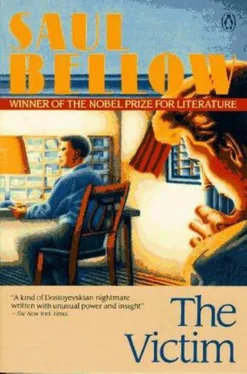Saul Bellow - The Victim
Здесь есть возможность читать онлайн «Saul Bellow - The Victim» весь текст электронной книги совершенно бесплатно (целиком полную версию без сокращений). В некоторых случаях можно слушать аудио, скачать через торрент в формате fb2 и присутствует краткое содержание. Год выпуска: 1988, Издательство: Penguin Books, Жанр: Современная проза, на английском языке. Описание произведения, (предисловие) а так же отзывы посетителей доступны на портале библиотеки ЛибКат.
- Название:The Victim
- Автор:
- Издательство:Penguin Books
- Жанр:
- Год:1988
- ISBN:нет данных
- Рейтинг книги:3 / 5. Голосов: 1
-
Избранное:Добавить в избранное
- Отзывы:
-
Ваша оценка:
- 60
- 1
- 2
- 3
- 4
- 5
The Victim: краткое содержание, описание и аннотация
Предлагаем к чтению аннотацию, описание, краткое содержание или предисловие (зависит от того, что написал сам автор книги «The Victim»). Если вы не нашли необходимую информацию о книге — напишите в комментариях, мы постараемся отыскать её.
The Victim — читать онлайн бесплатно полную книгу (весь текст) целиком
Ниже представлен текст книги, разбитый по страницам. Система сохранения места последней прочитанной страницы, позволяет с удобством читать онлайн бесплатно книгу «The Victim», без необходимости каждый раз заново искать на чём Вы остановились. Поставьте закладку, и сможете в любой момент перейти на страницу, на которой закончили чтение.
Интервал:
Закладка:
His wife spoke up. “Don’t pay any attention to him,” she said. “You sing it very nicely.”
“Aaah, yes he does,” he said contemptuously.
“Why, thank you, Mrs Allbee,” said Harkavy. “It’s a lovely song.”
“Go on, Dan, go on with it,” Phoebe Williston urged him. And Leventhal said, “Sing the rest of it.
“I’m going to,” Harkavy replied, and began over.
“No, no, no!” Allbee broke in again. “You shouldn’t sing those old songs. You have to be bred to them.”
His wife colored and said, “Kirby, don’t be like that.”
“Oh, I don’t mind, ma”am.” Harkavy drew in his chin and crossed his arms, his round eyes glimmering.
“Sing, Dan,” said Leventhal.
“Sing a psalm. I don’t object to your singing. Sing one of the psalms. I’d love to hear it. Go ahead. I would,” said Allbee.
“I don’t know any psalms.”
“Then any Jewish song. Something you’ve really got feeling for. Sing us the one about the mother.” And with a drunken look of expectancy he bent forward, leaning on his knees, and pretended to prepare to listen. It was apparent to everyone that he was deeply pleased; he smiled at Harkavy and the girl, and he had a glance for Leventhal, too. His wife seemed quietly to dissociate herself from him. The Willistons were embarrassed. Allbee was not merely an acquaintance but a friend, and Williston later tried to make excuses for him and explain away the insult.
That was what had happened. Leventhal had naturally been angry, but not for long. He had shrugged it off. Did Allbee think something like that would make him go to such lengths for revenge? He was an idiot if he did. He overestimated the magnitude of the insult and his power to be insulting. Or did he think that on that night he had revealed something that was not plain before? Then he was twice as idiotic. “And if I were mad, is that what I would do?” thought Leventhal. “He gives himself an awful lot of credit for nothing. Who does he think he is?”
That he had afterwards asked Allbee for an introduction to Rudiger should have shown how much importance he attached to the incident. At that time, Williston’s man had returned from Arizona and Leventhal was looking for another place. Williston gave him a very good reference letter which made it easier to get interviews. However, several months went by before Leventhal was hired by Burke-Beard and Company, and during those months he was despondent and became quarrelsome once again, difficult, touchy, exaggerating, illogical, overly familiar. Reports of this reached Willis-ton, who called him in and lectured him. Leventhal was bitter and suspicious of him and he offered to return the letter — foolishly, he now realized. But he thought that Williston regretted writing it.
It was his own idea to approach Allbee about a job at Dill’s . Williston endorsed it and may have been instrumental in getting Allbee to introduce him to Rudiger. Or perhaps Allbee agreed in order to make up for his unpleasantness. Williston tried continually to explain it away. You had to know Allbee when he was sober, he said; he was intelligent and decent. His New England upbringing was behind his drinking; there were ministers in his family, influences to throw off, and once he threw them off he would be another man. Leventhal indifferently acknowledged that that might be so; he had no particular grudge against him. “I’ll be much obliged to him if he gets me the introduction. What a break if I could land a job with an outfit like that.”
The interview at Dill’s still troubled him.
Rudiger kept him waiting for nearly an hour in the reception room and for a few minutes more in his office. He was watching several tugs shouldering a huge liner up the river and his back was turned. But as soon as he faced about, Leventhal knew at once that he had nothing to hope for; he saw even before Rudiger uttered his first word that he did not want him. He was a short man, broad featured and red; his hair was intensely red. He had a mustache of short golden hairs overspread by a powerful nose with the cartilages widely separated at the tip. He spoke energetically, peremptorily, quickly, in a husky tone. At the outset Leventhal thought, “I’ve hit him at a bad time.” Later he could not decide whether he had come upon him in an unusual mood of great stress and aroused cruelty or whether Rudiger had only treated him as he generally did people whom he didn’t want to hire and who were wasting his time. In telling Harkavy about it that same afternoon, Leventhal said, “He was burning like a boiler. I never saw anything like it.”
“Well?” Rudiger said, putting his hands on the desk. He might have been arresting momentarily a swing back to the window. Leventhal began to speak, and he cut him off with, “No vacancies, no vacancies here. We’re filled. Go somewhere else.”
Leventhal said stumblingly, “I thought there might be an opening here. I didn’t know… Didn’t Mr Allbee say what I wanted?”
Rudiger looked at him awhile. They were on the sixtieth floor of the Dill Building. The sun was far behind the dull, black, tarnished spikes and pinnacles of the skyscrapers below.
“What’s your experience?” he said.
Leventhal told him.
“No, never mind that stuff. What newspapers have you been on?”
“No papers,” Leventhal said rather nervously.
Rudiger burst out, inflamed, “Then what in the name of hell are you taking up my time for? What are you doing here? Get out. By Jesus, you come pestering around here when I’m busy without a goddam thing to offer.”
“I’m sorry to bother you.” Leventhal spoke stiffly, not to reveal his alarm.
“This is a news magazine. If you have no news experience, you’ve got no business here. Do you think we run a vocational school?”
“I thought I could do the work. I’ve read your magazine, and I thought I could.” He labored at the words, stalling, and bent his head.
“Oh, did you? Did you?”
“Yes…” He was beginning to recover his presence of mind. “I didn’t know my experience wasn’t the right kind for you. I have a letter from Mr Williston. He says he knows you.” Leventhal reached into his pocket.
But Rudiger exclaimed, “I don’t want to see it.”
“Well, Mr Williston said he didn’t see why I shouldn’t be able to handle a job here…”
“Nobody asked him. I don’t care what he said.”
“I think he knows what he’s talking about. I respect his opinion.”
“I know my own business. Never mind about Williston. I ought to know what I need here. You’re not it.”
“You probably know your business,” Leventhal said stolidly, evenly, hunching his head forward. “I’m not saying you don’t. But there’s nothing so special about your magazine. I’ve read it, as I said.” He put a cigarette in his mouth and, without asking Rudiger’s permission, reached for a packet of matches on his desk, tore out one, struck it, and threw it into a tray. Angry and tense, he managed to present a surface of dry, uncaring calm. “Anybody who can write English can write for it. If you gave a man a try and then thought he couldn’t make the grade, I’d say you knew your business a lot better. That’s a prejudice, Mr Rudiger, about newspaper experience.”
Rudiger shouted, “Oh, is it?” Leventhal saw that he was not invulnerable, and by now a spell had been created, an atmosphere of infliction and injury from which neither could withdraw.
“Sure it is,” said Leventhal rather easily. “It’s a guild. Any outsider hasn’t got a chance. But as a matter of fact you ought to think of your paper first and hire people because they can do the work. It wouldn’t hurt.”
“You think you could improve the paper?”
Читать дальшеИнтервал:
Закладка:
Похожие книги на «The Victim»
Представляем Вашему вниманию похожие книги на «The Victim» списком для выбора. Мы отобрали схожую по названию и смыслу литературу в надежде предоставить читателям больше вариантов отыскать новые, интересные, ещё непрочитанные произведения.
Обсуждение, отзывы о книге «The Victim» и просто собственные мнения читателей. Оставьте ваши комментарии, напишите, что Вы думаете о произведении, его смысле или главных героях. Укажите что конкретно понравилось, а что нет, и почему Вы так считаете.











